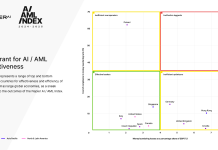In the high-speed and complex financial landscape we find ourselves in today, one of the most significant hurdles to overcome is the ever-present threat of financial crime. Acuminor has outlined how firms can leverage risk assessment processes to boost optimization, customer satisfaction and competitive advantage.
Financial crime poses a serious threat to the economic health, reputation, and stability of banks and other financial institutions. To mitigate these potential threats, Acuminor explained, financial institutions wield a formidable tool: financial crime risk assessment. This tool involves pinpointing and appraising the possible risks a business might confront from financial crimes such as bribery, fraud, cybercrime, and money laundering. The results from the risk assessment process are strategically utilised to funnel resources to areas where the risk of financial crime is elevated.
It’s crucial to recognise that the importance of financial crime risk assessment isn’t limited to maintaining regulatory compliance. Rather, it serves as a strategic tool that can help enhance key financial crime processes, bolster customer satisfaction, and help a company differentiate itself in the market.
Acuminor explained that the strategic value of financial crime risk assessment is threefold. Firstly, it ensures that an institution complies with the stringent standards set by international regulatory bodies, thus preventing potential penalties and preserving their market standing.
Secondly, it aids in reputation management. A comprehensive risk assessment process empowers organisations to detect and counteract potential risks before they can morph into major problems, safeguarding the institution’s public image and maintaining customer trust.
Finally, it safeguards the financial health of an organisation. Financial crimes can lead to substantial financial losses and legal penalties. A thorough risk assessment process can shield an organisation’s financial health by pinpointing high-risk areas and putting in place appropriate controls.
Financial crime risk assessment plays a critical role in optimising key anti-financial crime processes, leading to cost-effective solutions and operational efficiency. For example, the risk-based insights generated from a thorough risk assessment can help refine transaction monitoring systems.
This allows organisations to concentrate resources on high-risk transactions, decreasing false positives and enhancing the effectiveness of detection mechanisms. Additionally, the risk assessment process can improve Know Your Customer (KYC) procedures by adjusting the level of due diligence according to the customer risk profile, increasing accuracy and efficiency, and improving the customer experience.
A robust financial crime risk assessment process can offer a unique competitive advantage. By streamlining KYC processes and reducing false positives in transaction monitoring, the customer experience is improved, resulting in higher satisfaction rates. Moreover, a firm commitment to fighting financial crime, embodied by a comprehensive risk assessment process, can differentiate an organisation in the marketplace, contributing to its brand reputation and customer trust.
In conclusion, while financial crime presents substantial challenges, it also offers a chance for strategic differentiation. Utilising financial crime risk assessment to optimise key processes can lead to cost-effective measures, improved customer satisfaction, and a competitive edge. The strategic significance of risk assessment in the battle against financial crime is undeniable. It provides a means to navigate the increasingly complex global economy, enabling organisations to strengthen their defences, preserve their reputation, and continue to succeed.
Read the full post here.
Keep up with all the latest FinTech news here
Copyright © 2023 FinTech Global
Copyright © 2018 RegTech Analyst






